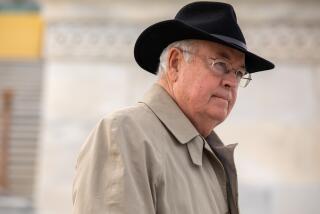Starr Asks for Permission to Further Pursue Hubbell
- Share via
WASHINGTON — Even if a federal appeals court fails to revive the tax evasion case against Webster L. Hubbell, the former Justice Department official and longtime golfing friend of President Clinton still could face further prosecution.
Independent counsel Kenneth W. Starr disclosed Wednesday that he has asked Atty. Gen. Janet Reno to let him pursue the case against Hubbell. Deputy Atty. Gen. Eric H. Holder Jr. will make the decision because Reno has recused herself, a Justice Department attorney said, presumably because Hubbell served as associate attorney general under her.
The developments in the Hubbell case came to light as the U.S. Circuit Court of Appeals here heard arguments on Starr’s appeal of a federal judge’s dismissal of the tax case against Hubbell, his wife, Suzy, his accountant and his tax lawyer.
U.S. District Judge James Robertson on July 1 dismissed the indictment on grounds that Starr had exceeded his authority by investigating Hubbell on tax charges. Robertson also ruled that the case was improperly based on documents Hubbell had turned over under a grant of immunity.
Robertson, a Clinton appointee, said the three-judge court that oversees independent counsels erred when it approved Starr’s request to expand his jurisdiction to bring the Hubbell tax charges. The court can act only if such a move is requested by the attorney general, Robertson said.
Appeals Court Judges Patricia Wald, David Tatel and Stephen Williams appeared skeptical Wednesday of arguments by Starr and John W. Nields Jr., lawyer for the Hubbells, making any ruling difficult to predict. Their decision could come by early next year.
When Starr revealed in court that he recently had written Reno asking that she give him authority to investigate the tax charges, Wald observed that the letter was “late in the day” but asked to be advised on the Justice Department’s response.
Starr’s letter, it was learned, was in response to a footnote in the Justice Department’s friend-of-the-court brief in the case. The brief supported Robertson on the jurisdiction issue but disagreed with the judge on whether records supplied by Hubbell could be used against him.
In the footnote, Justice Department lawyers said that, if the appellate court agreed Starr had overstepped his authority, there was no need to decide the question of whether Hubbell’s 5th Amendment protection against self-incrimination had been violated by use of his own documents.
Instead, the footnote suggested, Starr could ask Reno to refer the tax matter to him or expand his jurisdiction to include it. Then, if a new indictment is brought, Hubbell’s attorneys could raise the self-incrimination question.
Nields contended that Starr’s tax case against the Hubbells signaled that there were “no knowable or foreseeable limits” on the jurisdiction of the independent counsel.
But Judge Williams questioned whether Nields’ approach would produce “a hobbled prosecutor,” barred from using “perfectly standard prosecution techniques.”
Starr took issue when Tatel, who noted that the dismissed tax case failed to include any obstruction, suggested there was no such evidence. Starr has been investigating whether hundreds of thousands of dollars in consulting fees paid to Hubbell, arranged by friends of Clinton, were attempts to buy his silence on Whitewater matters being investigated by his office.
Starr said that the information was shielded by federal grand jury rules of secrecy, but that he could submit it under seal. He said the judges “should not indulge” in the assumption that such evidence is lacking.
Wald noted, however, that the judges do not know of such evidence on the public record.
More to Read
Get the L.A. Times Politics newsletter
Deeply reported insights into legislation, politics and policy from Sacramento, Washington and beyond. In your inbox twice per week.
You may occasionally receive promotional content from the Los Angeles Times.









